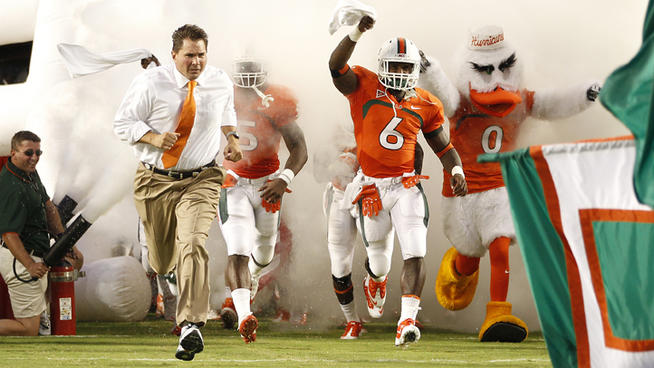Premier League Alert, This Arsenal team is for real.
Prev post1 of 1Next post Use your ← → (arrow) keys to...

On Tuesday, the NCAA announced that the University of Miami football program would be stripped of nine scholarships over the course of three years for the actions of rogue booster Nevin Shapiro, who is currently serving a 20-year sentence for running a Ponzi scheme that cost investors $82.7 million.
To refresh your memory (it seems like it was five years ago that the NCAA announced that it would be investigating the University), it was Yahoo! Sports-in August of 2011-that published the findings of well over 100 hours of interviews conducted with Shapiro, in regards to his eight-year run of supplying certain Miami football players and recruits with everything an 18-year-old kid would want.
Now that the relatively light sanctions have come down, Miami should send the Trojans of USC a fruit basket for showing to the world how NOT to handle an impending NCAA investigation. To Miami’s credit, following the sanctions handed down to USC for what was deemed a “lack of institutional control,” the Hurricanes took what they learned from USC’s fight against sanctions with the NCAA, and completely reversed them. In doing so, Miami has created the perfect way to handle the NCAA. For starters, groveling helps. Miami looked deep inside of its football program, admitted mistakes, and imposed sanctions on itself, losing allegedly ten scholarships over the span, and a two-year bowl absence. Aside from the self-imposed sanctions, Miami did the exact opposite of USC: they apologized for the trouble, and following the NCAA’s announcement, the university stated that it would not appeal the NCAA’s findings.
Last month, the NCAA announced that they would gradually reduce the sanctions levied against Penn State University in the wake of the Jerry Sandusky scandal. Current USC Athletic Director Pat Haden was allegedly on a plane to Indianapolis not long after, obviously in a vain attempt to argue in favor of easing the sanctions on USC. Considering the gravity of the Penn State scandal, and the blatant disregard for NCAA rules on the part of Shapiro in regards to Miami, the question is why were the sanctions that were levied against USC so severe? A two-year bowl ban, loss of 30 scholarships, and the vacating of wins seems a steep price to pay for transgressions of one player (Reggie Bush). But USC demonstrated the way not to deal with the NCAA when you find yourself in hot water with them. Dealing with the NCAA is always a slippery slope because they have no precedent for most of the sanctions they place on schools, so trying to appeal the sanctions is beyond difficult. When an appeal from a sanctioned school does arise, the NCAA seems to convey some sort of higher power authority that cannot be challenged. Any athletic who dares to challenge the NCAA seems to hit a brick wall as a response.
Under former AD Mike Garrett (really actually under Pete Carroll, considering Carroll’s magnificent run as head coach of the program), USC publicly fought the findings of the NCAA. Their first approach was to be combative; this proved to be unhelpful during the interview process, and ultimately in the appeals process. That initial approach to the sanction ended poorly for the Trojans, as they still have a year left of scholarship reductions.
Now where are we? Penn State has used its fiercely loyal fan base and its sanctions in their favor; they’ve become a defacto “America’s Team.” Under Bill O’Brien, it’s kind of like watching an episode of Friday Night Lights every time the team takes the field, despite the fact that they are a university still fully capable of drawing as many student athletes as they please. Al Golden’s hiring at the University of Miami came just as the Nevin Shapiro story broke. In his first season, Golden’s team struggled to a 6-6 record, but followed that the next season with a 7-5 campaign. Now, the ‘Canes sit at 6-0, and Golden’s always honest recruiting pitch of “we’re not sure what the sanctions are going to be like,” now makes him look even better. He’s even drawing West Coast talent to Coral Gables again.
And USC? They just fired their head coach mid-season, the same head coach who took every opportunity he had to blame the sanctions for poor game planning, poor execution, and inexcusable losses to teams harboring lesser talent. USC just lost in South Bend to their rival, Notre Dame, for the first time in what seems like 40 years. The Trojans now have to finish out the season with a lame duck coach, before really being able to do the lion’s share of the coaching search in the offseason (they’ll find a way to do some of it now).
As the criticism of the NCAA mounts, the announcement of the sanction reductions for Miami doesn’t help the NCAA’s image. But thanks to Miami, universities now have a blueprint for successfully circumventing potentially catastrophic sanctions, by just saying “sorry.”
Prev post1 of 1Next post Use your ← → (arrow) keys to...
Prev post1 of 1Next post Use your ← → (arrow) keys to...
Prev post1 of 1Next post Use your ← → (arrow) keys to...
Prev post1 of 1Next post Use your ← → (arrow) keys to...
Prev post1 of 5Next Use your ← → (arrow) keys to browse...
Prev post1 of 14Next Use your ← → (arrow) keys to browse...
Prev post1 of 1Next post Use your ← → (arrow) keys to...
Prev post1 of 1Next post Use your ← → (arrow) keys to...




